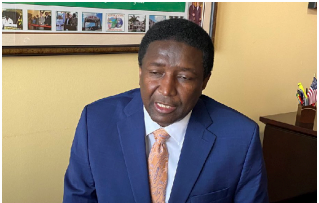CARICOM, UN discuss ways to strengthen cooperation
GUYANA – Representatives of the Caribbean Community (CARICOM) and United Nations (UN) System began their Fourth General Meeting Thursday, January 26 pledging to accelerate work towards the further development of the Region.
At the formal opening ceremony at the CARICOM Secretariat, Georgetown, Co-Chair of the Meeting, Deputy Secretary General, Her Excellency Ambassador Lolita Applewhaite recognized the UN’s support for CARICOM’s response to the global environment, but pointed to the challenges the Region faced, in spite of the classification of many Caribbean states as middle income developing countries.
Widening economic and social disparities through the erosion of preferential trade arrangements, the threat of insecurity through HIV/AIDS, traffic in illicit arms or terrorism, environmental degradation, social dislocation and unrest, were among the challenges she identified.
“CARICOM’s daunting task is, through its own efforts and global partnerships like those enjoyed with the UN, to counter the threats and access the promises of the evolving global reality on behalf of the Caribbean people.
CARICOM is doing so through ambitious integration architecture – the Single Market and Economy (CSME) – and the UN continues to faithfully accompany the Community as it strengthens itself to face the treacherous currents of the global sea change that is globalization,” the Deputy Secretary General said.
Assistant Secretary General, Department of Economic and Social Affairs, and Co-Chair of the meeting, Mr. Kwame Sundaram Jomo, hailed CARICOM as an important contributor to the UN’s work in the Caribbean Region and noted the bold steps the Community had taken to enhance its trade competitiveness and its work on advancing Regional security.
With regard to the launch of the CARICOM Single Market, Mr. Jomo said the UN will continue to work with CARICOM to build up capacity, diversify exports and “avoid the perils of protectionism.” He also referred to the Community’s involvement in Haiti’s effort towards democracy and development and said that increased coordination between the UN and CARICOM could “go a long way towards fully addressing many of Haiti’s most pressing needs.”
“The UN, for its part, remains strongly committed to helping your members address concerns like poverty, drug trafficking, crime and HIV/AIDS. This meeting offers an opportunity to discuss ways to strengthen our cooperation, and to explore other areas of mutual interest,” the Assistant Secretary General said.
“Working together, the United Nations and CARICOM have already achieved a great deal. But we can go even further,” Mr. Jomo said.
On the meeting’s agenda are a review of the actions taken following the Third Meeting held in 2004 and discussion on the strategic objectives of the Region to facilitate a more responsive program of cooperation for the next two years, Implementation of the CARICOM Single Market and the development of a framework for the Single Economy; strengthening governance and security within the Region; and Advancing Human and Social Development are among the other items on the agenda.
The UN delegation to the meeting comprises representatives from the Department of Economic and Social Affairs (DESA), Department of Disarmament Affairs, the Department of Political Affairs, the Office of the Coordinator for Humanitarian Affairs, United Nations Development Program (UNDP), United Nations Children’s Fund (UNICEF), United Nations Population Fund (UNFPA), Joint United Nations Program on HIV/AIDS (UNAIDS), the Economic Commission for Latin America and the Caribbean (ECLAC), the International Labor Organization (ILO), World Health Organization/Pan American Health Organization (WHO/PAHO), International Telecommunications Union (ITU), and the United Nations Stabilization Mission in Haiti.
The Regional bodies at the forum are the Caribbean Agricultural Research Development Agency (CARDI), Caribbean Center for Development Administration (CARICAD), the Caribbean Disaster Emergency Response Agency (CDERA), the Caribbean Community Climate Change Centre (CCCCC), Caribbean Congress of Labor (CCL), Caribbean Food and Nutrition Institute (CFNI), Caribbean Institute for Meteorology and Hydrology (CIMH), Caribbean Meteorological Organization (CMO), Caribbean Regional Fisheries Mechanism (CRFM), Caribbean Telecommunications Union (CTU), the Organization of Eastern Caribbean States, and the Universities of the West Indies and Guyana.


